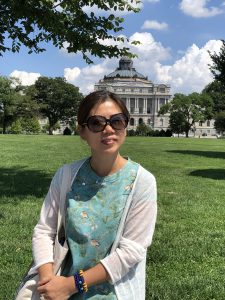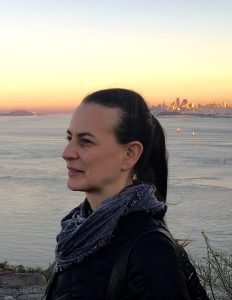Dr. Kirsten L. Ziomek (Associate Professor of History, Adelphi University), 2022-2023
Kirsten L. Ziomek is associate professor of history at Adelphi University in New York. Her research and teaching interests focus on Japanese empire, imperialism, colonial subjects, indigenous people, visual culture, the Asia-Pacific War, gendered mobilities, cultural history, East Asia, Japan, World History and comparative empires.
 Her first book Lost Histories: Recovering the Lives of Japan’s Colonial Peoples (Harvard University Asia Center, 2019) was awarded the 2020 John Whitney Hall Honorable Mention. At UCSB’s East Asia Center, she is working on a collaborative project with Sabine Frühstück and Soohyun Lee (East Asian Languages and Cultural Studies) that seeks to rewrite the military narratives about the Asia-Pacific War by looking at how people across East Asia, including Japan’s colonial subjects and indigenous people from within and without the empire experienced the war. The project aims to highlight the Asia-Pacific War as a transimperial war from the perspectives of those often left out of official military histories.
Her first book Lost Histories: Recovering the Lives of Japan’s Colonial Peoples (Harvard University Asia Center, 2019) was awarded the 2020 John Whitney Hall Honorable Mention. At UCSB’s East Asia Center, she is working on a collaborative project with Sabine Frühstück and Soohyun Lee (East Asian Languages and Cultural Studies) that seeks to rewrite the military narratives about the Asia-Pacific War by looking at how people across East Asia, including Japan’s colonial subjects and indigenous people from within and without the empire experienced the war. The project aims to highlight the Asia-Pacific War as a transimperial war from the perspectives of those often left out of official military histories.
Kirsten Ziomek earned her PhD in History from the University of California, Santa Barbara (2011) and worked with Sabine Frühstück, Luke Roberts, Paul Spickard, and Ann Elise Lewallen.
Ha Sung Hwang (Professor, Dept. of Media and Communication at Dongguk University) 2019-2020
Dr. Hwang earned her PhD in mass media and communication from Temple University. As a faculty member at Dongguk University, she teaches introductory courses in media theory and research methodologies, with emphasis on survey analytic method. Before joining academia, Dr. Hwang worked as a TV documentary writer at Korean Broadcasting System. During her time at KBS she wrote scripts for documentary programs which dealt with social and environmental issues. Encouraged by such background, she teaches undergraduate courses concerned with news media wiring and media contents storytelling.
Dr. Hwang’s research interest mainly focuses on the effects of social media, with a particular focus on individual’s adoption of Social Networking Services (SNS) –Facebook and Instagram. Her work particularly examines SNS addiction and the effects of SNS on individual’s psychological well-being (loneliness/life satisfaction). Her studies have appeared in journals including, Information, Communication & Society, Social Behavior and Personality, The Social Science Journal, and Transactions on Internet & Information Systems.
To date, Dr. Hwang’s research interests lie within the Hallyu (Korean Wave) phenomenon. She is interested in studying the role of SNS, its relationship with popularity of K-pop contents among global audience. In line with this, at UCSB’s East Asia Center, she is investigating the key factors that contribute to the adoption of Hallyu in the American society by focusing on the American ARMYs. In her project she will examine how the American BTS fans facilitate SNS to adopt or spread K-pop contents and whether (or in what ways) such SNS activities affect their life satisfaction.
Yan Li (Associate Professor, Nanjing Xiaozhuang University), 2018-19
Dr. Li’s research project mainly focuses on two subjects. One is children’s literature, especially Chinese contemporary children’s literature. The other concerns aesthetic trends of non-fiction writing in the past decade in China. At UCSB’s East Asia Center, Dr. Li will study the reception and acceptability of Chinese contemporary children’s literature in American society. She is interested in examining how American readers interpret Chinese children’s literature, as well as how they value cultural and aesthetic elements in these works. She will also study new images of children and gender in Chinese contemporary children’s literature and beyond. Dr. Li is also keen on learning more on aesthetic trends in non-fiction writing and its impact on journalism, literature, film, television and other fields in China and elsewhere.
After graduating as a PhD from Nanjing University, Yan Li worked as a children’s book editor at a publishing house for 15 years. She edited works by many famous Chinese children’s literature writers, including Cao Wenxuan, the first winner of the Hans Christian Andersen Award in China, Sun Youjun, Mei Zihan and Huang Beijia, among others. She is an Associate Professor in the School of Literature at Nanjing Xiaozhuang University (founded by Tao Xingzhi in 1926). She is the translator of Story Telling in the New Hollywood (Chinese Version, New Star Press, 2009).
Ellen Van Goethem (Associate Professor, Kyushu University), 2018-19
The project I will be pursuing at UCSB’s East Asia Center is an extension of my research on site divination practices (fengshui or geomancy) in East Asia. Since 2007, a group of five Kyoto shrines has been advertising itself as the age-old geomantic guardians of Japan’s ancient capital, despite the fact that only some of these shrines existed when the capital was founded in the late eighth century. The main focus of my research is on Heian jingū, the youngest––yet, apparently, the most important––shrine in the configuration. From its establishment in 1895, Heian jingū has been suffused with references to the guardian deities of the cardinal directions. The shrine emphasizes these references even more today to justify its central role in the configuration, and to tap increased tourist interest resulting from the current popularity of the guardian deities and the “power spot” boom.
Ellen Van Goethem is associate professor in the Faculty of Humanities, Kyushu University and co-chair of the International Master’s Program (IMAP) and International Doctorate (IDOC) in Japanese Humanities. Her research focuses on ancient Japan’s capital cities, on site divination in East Asia, and, more recently, on the influence of Chinese cosmological symbolism on Shinto shrines. She is the author of Nagaoka: Japan’s Forgotten Capital (2008).
Silke Werth, PhD (2016-17)
 Silke Werth is mainly interested in the analysis of the dynamic changes of modern and contemporary Japanese culture and society in a global context, especially around the themes of emerging adulthood, migration, the social construction of place, space, gender and race, civil society and social sustainability. Engaged in interdisciplinary, transnational multi-method research, Dr. Werth is currently examining how a range of Japanese individuals address social, political and economic frictions in an effort to redirect their own life courses while also achieving social sustainability across national borders.
Silke Werth is mainly interested in the analysis of the dynamic changes of modern and contemporary Japanese culture and society in a global context, especially around the themes of emerging adulthood, migration, the social construction of place, space, gender and race, civil society and social sustainability. Engaged in interdisciplinary, transnational multi-method research, Dr. Werth is currently examining how a range of Japanese individuals address social, political and economic frictions in an effort to redirect their own life courses while also achieving social sustainability across national borders.
Silke Werth earned her PhD in East Asian Languages & Cultural Studies from the University of California, Santa Barbara (2016). In her dissertation “Japan’s Generation Z on the Move: Moratorium, Maturity and Home-making” she analyzes how migration and cultural exchange impact notions of self, society, and decision making of emerging adults in search of a place to call home.
The Visiting Fellows Program is postponed for July 2020 to June 2021.
Starting July 2021, the Center will welcome applications from scholars in any discipline of the humanities and social sciences working on East Asia to spend a period of three to twelve months in 2022 as a Visiting Fellow of the Center. Visiting Fellows will be provided with office space and a computer at the EAC and with UCSB library privileges in addition to assistance with visa procedures. During their stay they will be invited to present a seminar on their work to the EAC community. The fellowship does not carry a stipend and the fellow is responsible for their own health insurance and for finding housing in Santa Barbara. It is recommended that a contact is established with a faculty member whose work relates to or overlaps with that of the applicant.
Most UCSB departments are able to offer qualified visitors temporary affiliate status during their stay, and applicants are encouraged to contact one or more UCSB faculty members working in related fields to explore the possibilities of such a sponsorship. Applicants might want to consult the list of EAC affiliates. Such affiliations do not include teaching responsibilities.
The EAC welcomes applications from university faculty and qualified independent scholars. In exceptional cases the EAC will also consider applications from ABD graduate students.
Application
Applicants should:
- Provide a specific and well-defined description of the research project* of no more than 1 page; and
- Provide a curriculum vitae together with the names and addresses of two external references
*It is important that the applicant describes the research project, explains why the EAC is a suitable place to pursue it, specifies the proposed dates of the applicant’s stay, and provides the sources of financial support during the visit. Additionally, submitting a letter of support from a UCSB faculty member whose expertise best represents the applicant’s discipline and/or research project is recommended.


